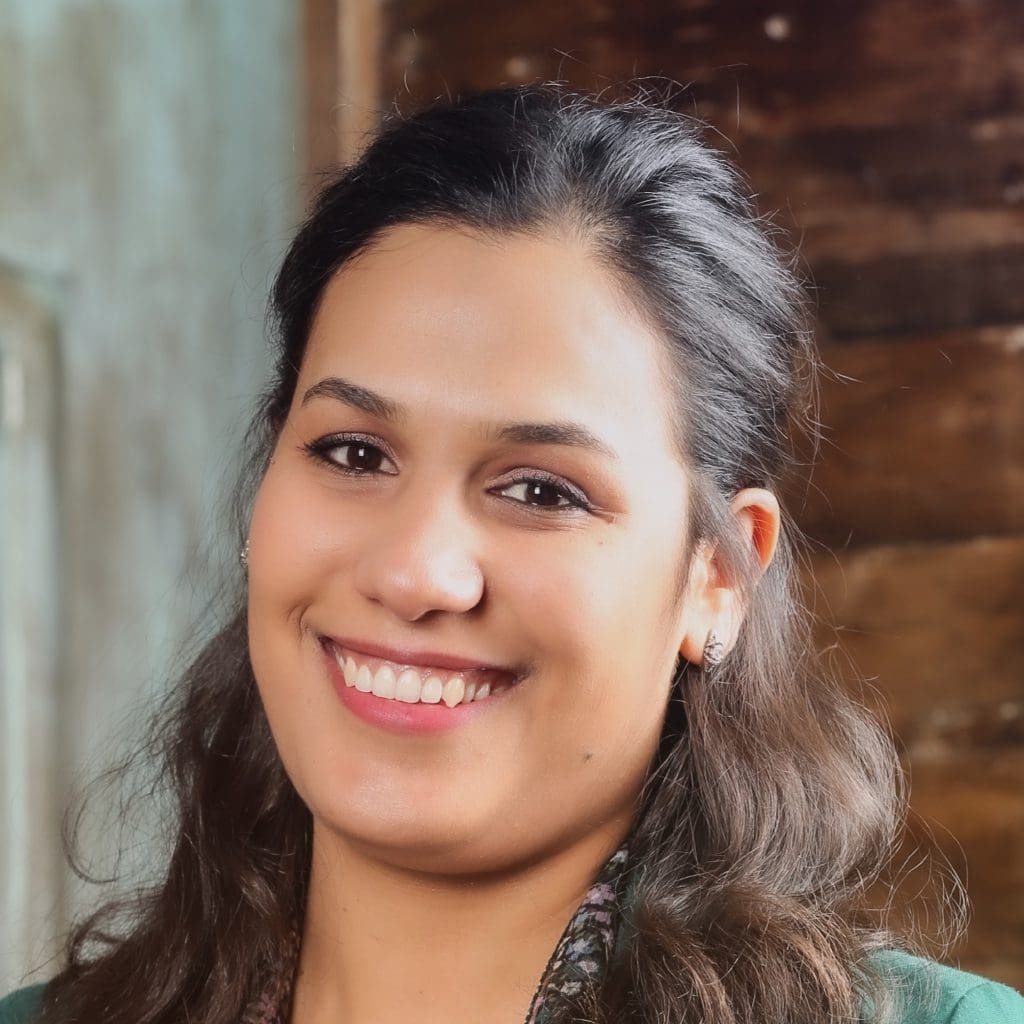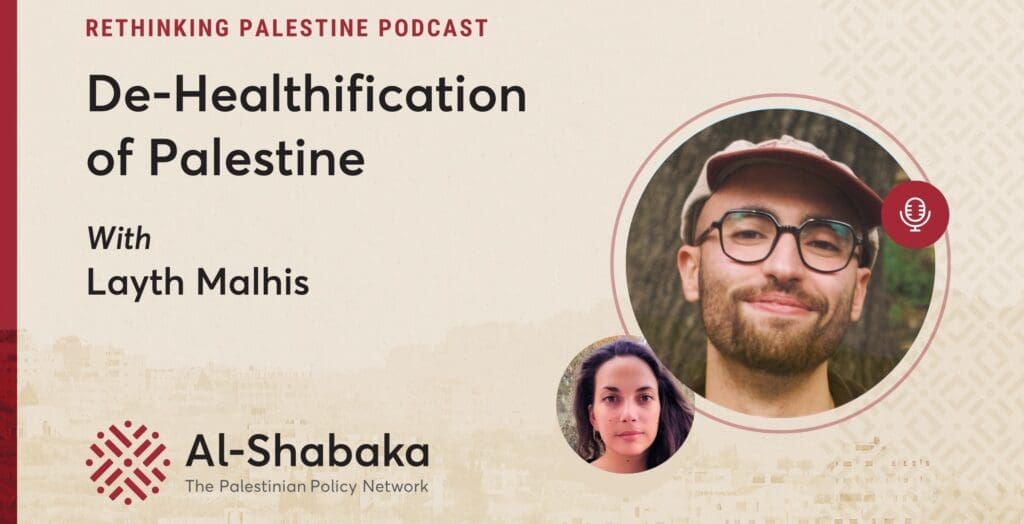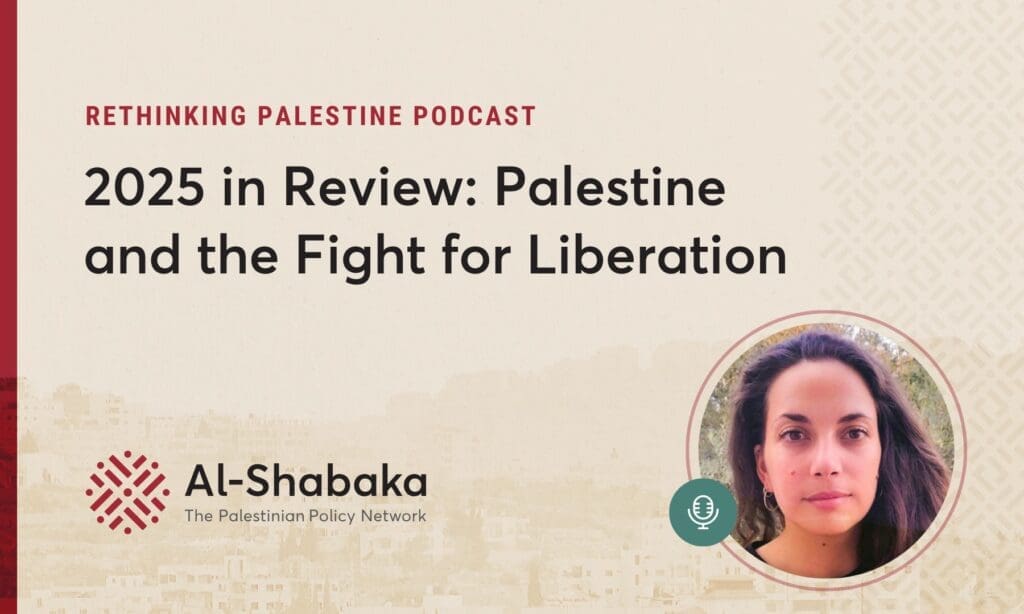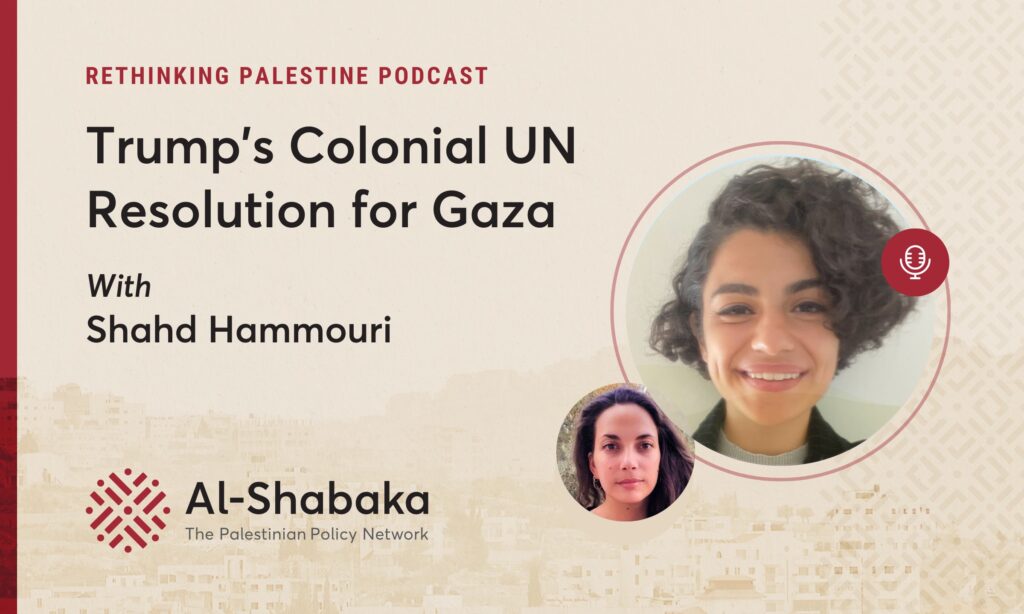About This Episode
Episode Transcript
The transcript below has been lightly edited for brevity and clarity.
Amal Nazzal 00:00
When you are not paying for the product, you are the product. I think this is the case with Facebook and other social media platforms, and all the scandals of Facebook, particularly, in violating our own digital rights and selling our data. So, because Facebook is a network designed to maximize its profits, political activism within this network definitely will be weak – if it’s not impossible.
Yara Hawari 00:32
This is Rethinking Palestine, a podcast from Al-Shabaka: The Palestinian Policy Network, a virtual think tank that aims to foster public debate on Palestinian human rights and self-determination. We draw upon the vast knowledge and experience of the Palestinian people, whether in Palestine or in exile, to put forward strong and diverse Palestinian policy voices. In this podcast, we will be bringing these voices to you, so that you can listen to Palestinians sharing their analysis, wherever you are in the world.
Over the last decade, social media has become increasingly a site for political activity and mobilization. Indeed, the revolutions that began over 10 years ago across the Middle East relied heavily on various social media platforms to get the masses out onto the street. Yet, whilst it’s been a useful tool in mobilization and activism, it’s also been used by state authorities as a tool of oppression. And in recent years, an increasing number of Palestinians have been reporting that their rights of expression are being suppressed by dominant social media platforms, such as Facebook, WhatsApp, Twitter, and YouTube. And this has included the removal of content, the blocking of accounts, and restrictions on access.
Now, to discuss all of this and more, I’m joined by Al-Shabaka policy member, Dr. Amal Nazzal, who is an assistant professor at the business and economics faculty at Birzeit University, and also an advisory board member for 7amleh – The Arab Center for the Advancement of Social Media. Amal, thank you so much for joining us on Rethinking Palestine.
Amal Nazzal 02:06
Thank you so much, Yara, for having me.
Yara Hawari 02:08
Can you start off by giving us an overview of what this increased suppression of Palestinian expression by dominant media platforms has looked like, and perhaps draw upon a recent policy brief that you wrote for Al-Shabaka, and specifically tell us about YouTube’s violation of Palestinian rights and how it’s violating its own guidelines when it comes to dealing with Palestinian channels?
Amal Nazzal 02:29
So I will started with your first question, actually, about the increased suppression of Palestinian digital rights. This has to be understood and looked at with the vast and massive Israeli technological advancement in surveillance technologies and cybersecurity.
Israel manufacturers and exports a massive amount of military and cybersecurity technologies, which makes Israel one of the top five countries in the world in it’s military and cybersecurity technologies, beside the US, the United Kingdom, France, and Germany. Adding to that, Israel has around 27 surveillance companies – and I’m citing here a report that was out in 2016 by Privacy International – which will make Israel, with the 27 surveillance companies, the highest number per capita of any country in the world. So we can imagine the high level of surveillance that we are under.
In 2014 as well, Israel’s world exports of cybersecurity and surveillance technologies – such as phones, cameras that we’re seeing on the Israeli checkpoints, internet monitoring – exceeded its military equipment exports, which is very worrying and terrifying as well. So that’s why the “efficiency” of monitoring Palestinians account and digital data is becoming bigger and bigger. Therefore we are witnessing more suppression, of course.
Another important point as well is the clear and obvious collaboration between Israel and different social media platforms, such as Facebook, Twitter, and YouTube. In 2019, Sada Social, a Palestinian digital rights organization, documented as many as 1,000 violations and 1,020 digital violations in 2020. And these types of violations – digital violations – they are the removal of public pages, removal of personal accounts, organization accounts, posts, publications, and sometimes restrictions of access. And when we look at this documented increase in Palestinian digital violations, this has also to do with the illegally-running operation of what the office of the Attorney General of Israel called the “cyber units.” So this illegal cyber unit, which came out in 2015, is designed and programmed to censor Palestinian content and to monitor Palestinian social media accounts.
As I said, the so-called cyber units – and I’m quoting here a press release by Adalah – The Legal Center for Arab Minority Rights in Israel – this cyber unit, as I said, that has started working and operating in 2015, it is mainly responsible for “dealing with cyberspace enforcement challenges via censorship of social media posts.” So basically what this unit does, by the help of its biased and discriminatory algorithms (this is the way how it’s designed), is to build profiles of what Israel views as likely Palestinian attackers or terrorists.
The cyber units that I’m talking about, monitor tens of thousands of Palestinians’ Facebook accounts. And the way it’s works is that it looks for particular words – such as shahid, Zionist state, Al Aqsa, Jerusalem, intifada, Palestinian resistance – and once the system or the cyber unit tracks any of these words, then the person or the user who posted this will be under high level of monitoring and surveillance. Not only the words, I should mention, but also the visuals, because the system also monitors videos, photos posted by Palestinians, or if there’s a photo or a video posted about Palestinians recently killed, for example, or jailed by Israel.
So what is purely illegal in here, Yara, is that the censoring system identifies suspects based on a prediction of violence. It’s only predictions that the person who posted such a post or video or analysis of something online, might do in the future any type of attack. This cyber unit and the whole monitoring system of Israel is illegally monitoring our online data, and based on some suspicious analysis from this unit, some Palestinians will get arrested. What makes it also even worse is that any Facebook profile which is marked as suspicious by the system and this unit is a potential target for a direct arrest, and the illegal law of the cyber unit allows the arrest to happen within 24 hours, and Israel’s main accusation will be that these Facebook accounts, posts, and visual materials are incitements of violence, of course.
So, based on what I have just discussed regarding how this Israeli policing system of cybersecurity works and operates, the recent numbers of Israeli and Palestinian Authority security force arrests was around 800. So 800 Palestinians were arrested from the Israeli and the Palestinian Authority security forces based on their posts on social media – in particular Facebook, because Facebook is the most popular social media platform.
Plus I can add to that, that Israeli security units play, let’s say, some dirty games actually inside the cyber space. It has been documented that Israeli security units set up fake Facebook accounts under Arabic names and cover photos and cover profiles of a Palestinian flag or any symbol of a Palestinian picture and visuals to trap some Palestinians or to gain access to different Palestinian Facebook profiles in order to gain private information, and sometimes target particular people or hack particular Facebook accounts. This private information, Yara, could be sexual orientation, medical or mental conditions, financial status, to exploit these Palestinians and blackmail them actually.
So this is in regard of the first question that you posed. The other part, about the policy brief that I wrote with Al-Shabaka, it was about YouTube’s violation of Palestinian rights and how it is violating its own guidelines when it comes to dating with Palestinian channels. There’s a lot of points that have been discussed in the brief but maybe now I would just briefly highlight two main findings that I found out in this research.
After I conducted in-depth interviews with Palestinian journalists, human rights defenders, activists, and some international human rights organizations, such as Witness and Article 19, we can say that finding #1 is that YouTube violates its own community guidelines, where it is not held accountable for the clarity and equity of its guidelines, and that YouTube maneuver s between different community guidelines interchangeably to justify content removal.
So some of us know that YouTube has four main guidelines and policies for content monitoring: spam and deceptive practices, sensitive topics, violent or dangerous content, and regulated goods. However, what I found out of the interviews of the discussion with the different Palestinian journalists and activists, that many users have indicated that their content on YouTube, like the videos they have posted, have been removed without falling under any of these categories.
For example, if the video does not match the violence community guidelines, then YouTube will say it violates another community guideline like sensitive topics. So there are ambiguous and misleading cues from YouTube to remove, particularly, the Palestinian context. So, as I said, for example, if your video hasn’t been deleted under violent or graphic content, it could be deleted under harmful or dangerous content, without clearly explaining what is the difference between the two.
So at the end of the day, you will find yourself as a YouTube or Palestinian activist or journalist active on YouTube lost in between the terms. You don’t know the difference between violent, offensive, abusive content or hate speech. So YouTube community guidelines are not clear and YouTube itself is using them interchangeably to erase and remove the Palestinian content at the end of the day.
The second finding is about YouTube’s algorithmic bias. YouTube’s artificial intelligence technology, Yara, is designed with a bias in favor of the Israeli content, this is what we have found, regardless of its promotion of violence to others. For example, YouTube has allowed Orin Julie, she’s an Israeli gun model, to upload content. She has multiple videos on YouTube, which clearly promote firearms, how to use the weapon, and how to kill, despite the clear violation of YouTube firearms content policy. YouTube does have a firearms content policy, but YouTube is totally fine with Orin Julie’s videos celebrating and promoting weapons and guns.
But on the other level, after I did an interview with a Palestinian journalist Bilal Tamimi, who’s also active on YouTube and where he recorded many of videos about demonstrations in Nabi Saleh, YouTube violated his right to post a video showing an Israeli soldier abusing a 12 year- old boy in Nabi Saleh in one of the demonstrations. YouTube’s excuse was that this video does have violent content. So you can see the double standard in here.
Another example I can give you is when I conducted an interview with the chief editor of a Al-Quds News, Iyad Al-Refaie. He explained to me how YouTube defines violence in multiple different ways. For him, YouTube has a problem with publishing a video of a Palestinian toddler killed by the Israeli army, and this has happened with him when he tried to post this video. But YouTube is totally fine with promoting Israeli militarization, as I said, andvideos of Israeli kids trained to shoot guns and how to carry a weapon, along with other Israeli YouTube channels celebrating Israeli militarized violence. If we go to YouTube now, we can see these videos – how to train your Israeli kid to use the gun.
So I just tried to give these examples to see how YouTube is treating the Palestinian content, and censoring the Palestinian content, and promoting the Israeli digital content although it does clearly have violence within its video.
The findings also show how Palestinian human rights, and the defenders that I interviewed, have experienced what we call the language and locative discrimination against the contents of their videos on YouTube. So, I will just make it simple here, so YouTube does use artificial intelligence algorithms to ease what contains violence and what does not. But we found that YouTube artificial intelligence and algorithms are trained to act in a bias way. And the biases are that the system, the AI – the artificial intelligence system of YouTube – will target the Arabic language videos disproportionately in comparison to other languages. So a video that does have an Arabic subtitle or speaks in Arabic, for example, will be under higher level of monitoring.
Plus what I called “locative discrimination,” that YouTube’s artificial intelligence mechanisms are also flagging the content that comes out of the West Bank and Gaza more than other particular locations in the word. Plus the more views Palestinian content receives, like if you are a YouTuber and you become more viewed from the Palestinian community, the more likely it will be surveilled, blocked, demonitized, and removed.
Yara Hawari 16:11
If you’re enjoying this podcast, please visit our website, www.al-shabaka.org, where you will find more Palestinian policy analysis, and where you can join our mailing list and donate to support our work.
Thanks, Amal for that. It was very extensive and clear that these are quite sophisticated and severe mechanisms, which are used to surveil and restrict Palestinians on social media, and really are so far-reaching and affecting so many Palestinians wherever they might be. And it’s also incredibly nasty, particularly the different types of blackmail that you mentioned.
Now, Amal, you talked about international companies and the Israeli regime cracking down on Palestinian digital rights, but the Palestinian Authority is also guilty of similar repression. In June, 2017, President Mahmoud Abbas passed a cyber-crime law, which was supposed to address a whole host of crimes, including blackmail, hacking, impersonation, etc. But what we’ve seen – and I think it’s of no surprise considering the increase in authoritarian trends within the PA – is that instead of protecting citizens’ digital security, the law has become a tool for quashing internal opposition online. We saw journalists arrested for criticizing the president, and of course the security coordination, which sees the sharing of information, including from social media, with the Israeli regime.
Can you talk to us a bit more about this?
Amal Nazzal 17:46
Right. So when I think about this particular violation, Yara, done by Mahmoud Abbas or his whole political agenda of security coordination with Israel and the occupation management implied in the West Bank, first I think we have to think and reflect about the structured violence within the PA, and, in particular, within Palestinian security forces.
I would just go back with you, Yara, to one of my PhD results, where I looked at the different dynamics and mechanisms of politically motivated social movements in Palestine between 2012 and 2015 – so it was the period exactly after the Arab Spring. For example, one of the findings out of my PhD revealed that there were tremendous efforts taken by the Palestinian security forces to challenge activists’ intentions, diminish their political credibility, tarnish their reputation, and question their more than integrity. Activists recounted what they had heard being said about them by Palestinian security forces, including opinions voiced in the public domain that they are immoral girls and guys, they are funded by international foreign NGOs and whatsoever, and they’re not pure Palestinians, and they have foreign political agendas and whatsoever.
The findings also reveal that the Palestinian security forces, riot police, intelligence units, and different plainclothes police officers would physically violate the activist as well. And all of that was happening, Yara, in the offline space. But still, the online space was also a part of this suppression and surveillance, where some activists were arrested and threatened as well, only because they were active online.
Here I’m quoting one of my interviews, while we were discussing this after his arrest by the Palestinian security forces. So, the interviewer is saying:
“We were witnessing a new revolutionary youth spirit in our oppressed Arab world. On TVs, we were watching Tunisian and Egyptian youths demonstrating and asking for their own rights. It was moving and inspiring. We started by mobilizing our close networks and then created a Facebook page to announce the demonstration. On that evening, I was threatened over the phone from the Palestinian police to delete the event because it was obvious that I was the admin. Any quick search on the internet can show up my name.”
What I’m trying to say here is that the suppression of Palestinian digital rights has been there since 2012. So, although the running of the operation of the new cyber-crime law started in 2015, the suppression and the oppression and the surveillance of the Palestinian digital rights and their online content and online political participation has been under Palestinian Authority monitoring since then.
And with the passing, as you said, of the cyber-crime law in 2017, I personally think that this is just a pretext and illegal cover to legitimize – or delegitimize online political activism based on the Palestinian Authority political agenda, which is definitely against any opposition voices in the occupied Palestinian territories, which, if we look at it, will add also another layer of violence and oppression to the Palestinian human rights. Because when we think also, Yara, about digital human rights, it’s a part of the whole matrix. So digital human rights is a part of the whole human rights matrix, and it is as important as other human rights.
So I think this new cyber-crime law is just a pretext and a cover for the Palestinian Authority to legitimize and delegitimize the online political activism and any other online behavior, according to what they see as suitable or not suitable, which is also worrying.
Yara Hawari 22:11
Yeah, it is worrying. It paints quite a stark picture for Palestinian digital rights, that this kind of oppression is really coming from all sides. And thank you, Amal, in particular for sharing that personal experience of yours.
Now, we all know that social media has become critical in activism globally, as demonstrated by the revolutions in the Middle East that you mentioned. Do you think going forward, Palestinians – and other politicized communities fighting injustice for that matter – should rely on social media? In other words, is it an effective site of resistance against injustice, or will social media or with the antithetical to fighting the status quo, considering that these are essentially multimillion dollar companies?
Amal Nazzal 22:57
I think this is a really interesting question. If I will think about it, I will just have to think about the network that we’re using, and is it suitable for political activism or not. Personally, I stand with and believe in the critical viewpoint of the realm of social media and political resistance and political activism in general.
Yes, as you said, social media has become critical in activism globally, and social media platforms recently have been questioned as to whether they are empowering us to better resist online or whether they weaken our political activism. I believe that social media does weaken our political resistance and activism online. But the question here is why? What is wrong about social media in that sense? Here, I will just highlight some few points that I touched upon in my research and in an article that I wish I would cover soon.
First, I think we have to keep reminding ourselves that Facebook, at the end of the day, as you said, is a capitalist company, which is aiming every day to maximize its own profits and the dividends of its shareholders. Facebook is not a charity. Facebook is not a global movement. $70.7 billion is the total revenue of Facebook in 2019, where it was $55.8 billion in the year before that. So we can see that big jump of total revenues that Facebook makes each and every year. The question is how come? It’s not because there’s around 1.7 billion users of Facebook, but it’s because Facebook and different social media platforms as well, do sell our own data, pictures, online behaviors, to other companies, other countries, and other intelligence services and units.
There’s a really nice quote, which I think makes perfect sense while we’re talking about this. It says, When you are not paying for the product, you are the product. I think this is the case with Facebook and other social media platforms and all the scandals of Facebook, particularly, in violating our own digital rights and selling our data. So because Facebook is a network designed to maximize it’s profits, just imagine how political activism would look like within this network. Political activism within this network definitely will be weak, if it’s not impossible.
But the question again is why? Why can we be politically active within a network designed to maximize its own profits, and market to make us buy more, and also use us and our data, pictures, and online behavior as product? Someone, Yara, could argue and say that while Facebook makes the money, I do have my own page, friends, and tools, and the network itself, and I’m free to write any post I want, and to mobilize and to start an event, and whatsoever.
I think that, no, you can’t. Even if you think, sometimes, that you are, Facebook at the end of the day is a network like any other network – Twitter, Instagram, and Tik Tok. These networks are designed by programs and business entrepreneurs to create a digital space crowded with weak – not strong, coherent – network ties. And when I say a tie, it’s just the ongoing relationship that we have. So, me and you on Facebook, we have a tie, that we know each other; it’s separate than the offline tie that we have. So the argument here is that Facebook and the social media networks are built on the philosophy of weak ties, not strong ties.
So if we want to analyze the way Facebook has been engineered and designed, we would find that it is based on a theory, what we call the strength of weak ties, which has been discussed by sociologist of networks, Mark Granovetter. The theory of the strength of weak ties tells us that, despite the fact that weak ties are an expression of social relations characterized by infrequent connectivity, poor emotional proximity and trust, weak ties are more powerful in disseminating information, finding job opportunities for individuals, marketing products, and making people aware of some issues more than strong ties that are embedded in our relationships between close friends and family.
Therefore, social media networks feed and grow on being designed and creating a weak social fabric – that is the weakly interconnected, rapidly spreading, and consumable Ties. this is a core reason why solid and serious political activism couldn’t take place. And I think all of us are witnessing and feeling this – that we have many networks online, we have many people that we know online, and I say “we know” in between brackets. But, how much do we know about them? And what about the trust level? And what about the emotional engagement?
So if we just think about this network and Facebook and how come I have 1,500 friends, the network itself is designed to spread my ties, to be weak ties. I know very little about these people; there are many, yes, but they are not strong ties where I can build with them a solid, serious, political resistance and activism. And this is, I think, a really important point to look at and reflect upon when we are politically engaging online.
So weak ties and the ease of acting online – nowadays, it’s very easy to put, “going for a demonstration,” to write a post, to share a video, to say something about a political viewpoint – this led to an online behavior we call slacktivism So slacktivism – which all of us, by the way, are involved in in different means – is the practice of supporting a political or a social cause by means such as social media: as I said, posting something, writing a post, posting a video, signing an online petition, joining a demonstration online, and all of these online political acts.
But slacktivism is a term that reflects that, yes, we’re doing these online political behaviors and acts, but they are very little in their effort or commitment. There is little commitment, low cost, and very low risk in the political activism. So, yes we do them, but we are pretty aware that they involve a low level of risk and low level of cost, and very little commitment. As someone would argue, why would I go for high-risk political activism? if everyone on this web is doing low-risk political activism, little commitment and low cost, then how will we do the serious political activism? who’s left to do it?
Another saying by Malcolm Gladwell, he’s an activist and writer and public speaker, on why he was criticizing What he called “Facebook activism”: he said, ” Facebook activism succeeds not by motivating people to make a real sacrifice, but by motivating them to do the things that people do when they are not motivated enough to make a real sacrifice.” And I think it’s a very simple and true quote about Facebook and other social media platforms, that they do provide us with tools to think that we are doing something real.
Yara Hawari 31:26
I really like that term slacktivism. It’s not something that I’ve heard before. And we all do it, perhaps even moreso since the pandemic. And you’re right, there is little commitment and cost. And so whilst it’s not necessarily always bad, I think there can be real political work done online, it can’t replace the real life work done on the ground. And you also raise some important questions and food for thought with regards to trust and networks online. Can we really develop serious political relationships online? And I liked that quote that you mentioned at the beginning: When you were not paying for the product, you are the product. I think that’s really important to dwell on.
Now, with the increase of social media as a tool for activists and social movements, we have simultaneously seen the increase in ethnographic research of its use and the people who use it as such. And I know, Amal, that you have written about this topic and have warned against the potential of causing harm when drawing attention to certain interactions on social media by researchers. Can you talk a little bit more about this, and perhaps point us towards a more responsible approach to ethnographic research of social media?
Amal Nazzal 32:39
Yeah, the article, which I co-authored alongside three other authors at the University of Exeter and Bath University, is titled “Ethical Concentrations and Challenges for Using Digital Ethnography to Research Vulnerable Populations.” We sought to clarify different methodological concentrations addressing the role of the researcher, online data representation, and the ethical concentrations necessary to research vulnerable populations. So we know that there are general ethical concentrations that each and every ethnographic researcher, or qualitative researcher, Has to pay attention to, such as anonymity, presentation of data, threat the researcher to go completely native with the community he or she is studying. But within the online spaces, while you are researching and studying different online behavior as a digital ethnographer, there are particular specific ethical concentrations that you have to be aware of.
So for example, we know that the web affords a high degree of visibility, which might facilitate the tracking of the participant’s online identity, relationship, and networks. Everything online will stay online – anything you post online will stay there – so the tracking and the monitoring is super simple. In Palestine – which is a country under Israeli colonization and occupation, plus the continuous monitoring by the PA and security units – the consequences of revealing the participants’ identities, locations, political opinions, might be very severe. Therefore the protection of the participant’s identity, their networks, location, what they have posted, must be given highest priority, because any governmental-level or security forces can simply track back any online posts, because they will never be deleted.
another important point as well is the presentation of the online data. So if I started searching one topic online about, let’s say, how the Palestinian youth are politically participating online, what do they think about this particular political case and whatsoever, and I collected all of the data from Facebook users’ comments, posts, etc., shall I present all of this online data in my research, although I anonymize the name of the user? No, we can’t. An online ethnographer has to think and reflect upon the data presentation. So, first of all, additional ethnographers should evaluate what is considered meaningful data, what has to be excluded, how the data can be filtered into appropriate categories for interpretation and analysis – what we call in the article critical reflection upon online data. So you have the choice as a digital ethnographer to exclude some data to protect the participants, and because you do believe that these pieces of online data could be easily traced.
Another way that some scholars also advocate in literature is data fabrication, online data fabrication, to protect participants’ identity, privacy, and anonymity. So, literally, data fabrication is to fabricate the data and present the data in different ways. In that sense, researchers may need to create what we call the composite dialogue through, for example, paraphrasing the participants’ quotations, paying careful attention to changing some small details, locations, maybe changing the social media platform – for example, if I collected this piece of online data from Twitter, I will say from Facebook – there are just small tricks to assure a participant’s confidentiality, privacy to protect them at the end of the day from surveillance, repression, and personal threats.
Yara Hawari 37:05
Amal, this has really been brilliant and I don’t want it to end, but unfortunately we have to. But perhaps before, you can give us a few words on what Palestinians can do to push back against these violations of their rights on social media platforms?
Amal Nazzal 37:21
Right, so if I make it quick, I’ll just break this question into two levels, the micro and the macro. So on the micro level, which is our level as individuals and users, rule number one: we have to keep reminding ourselves that these are capitalist companies. They want to maximize their profit. They are illegally selling our data, and we have to be aware. And they’re manipulating us as well, by their biased artificial intelligence systems. I’m not saying here, Yara, that we have to leave all of the social media platforms, no. They ease our life in a way or another; they connect us with people. But we should be aware of what we are dealing with.
Rule number two: we have to spend less time on social media, Palestinians in particular. A recent report shows that one out of every three Palestinians does use social media, and in general, we spend around 5.5 hours everyday on social media. this number is higher than the world average, which is two and a half hours. So, yes, we have to spend less time, and maybe do some actual offline work on the ground.
Also we have to be very aware of the high level of surveillance and monitoring that is happening online. in particular, in our case as Palestinians, from the Israeli security units, from the continuous monitoring of the Palestinian security systems and units, and also be aware of some dirty games implemented by the Israeli security. it’s not only fake accounts, or hacking personal accounts, but there is some new type of trapping Palestinians, which has been documented as the honey trap. And it’s a traditional way of trapping or spying on someone, but what’s happening online is that romantic and sexual content was sent to some particular Facebook accounts so they can start conversations with these Palestinians and then hack their accounts and get the sensitive information and then blackmail them. So definitely we have to be aware, and this has to do with the civil society organization bringing more awareness.
On the macro level, I think, as we mentioned before, the Palestinian Authority has to revoke it’s electronic crimes law. but as we said, to avoid any digital rights violations, the PA should consult with Palestinian civil society organizations and other relevant stakeholders to make sure that we are protecting Palestinians’ political rights, not violating their rights.
Yeah, I think these are some of the general tips and rules where we can push back, as you said, against the violations that we are facing from different social media platforms and authorities.
Yara Hawari 40:14
Amal, thank you so much for joining me.
Amal Nazzal 40:16
Thank you so much, Yara. Thank you.
Yara Hawari 40:20
Thank you for listening to Rethinking Palestine. Don’t forget to subscribe and leave us a review. For more policy analysis, and to donate to support our work, please visit our website, www.al-shabaka.org. You can also follow us on Facebook and Twitter.
Al-Shabaka: The Palestinian Policy Network is an independent, non-partisan, and non-profit organization whose mission is to convene a multidisciplinary, global network of Palestinian analysts to produce critical policy analysis and collectively imagine a new policymaking paradigm for Palestine and Palestinians worldwide.
Dr. Amal Nazzal is Assistant Professor at the Business and Economics Faculty at Birzeit University, Palestine. She received her PhD from the University of Exeter, where she studied the relevance of Bourdieu’s theory of practice for relationally capturing various practices, mechanisms, and dynamics in socio-cultural organizations. In particular, she focused on politically-motivated social movements. She has also researched social capital, social networking theory, digital ethnography, and social media content analysis. She has worked closely with the Palestine Economic Policy Research Institute (MAS) and 7amleh – the Arab Center for the Advancement of Social Media.

















